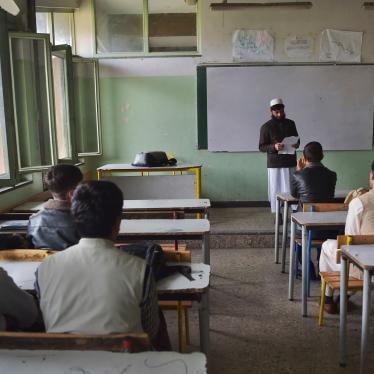(New York) -- Human Rights Watch warned today that the potential for ethnic violence in Afghanistan is likely to rise as armed conflict between the country's warring factions escalates.
In north-central Afghanistan, ethnic Hazaras have been repeated targets of such violence and remain particularly vulnerable, Human Rights Watch said. The Hazaras are Shi'a Muslims, sharply distinguishing them from the militantly Sunni and mainly ethnic Pashtun Taliban.
Not only is there a possibility of continued attacks by the Taliban on Hazaras and other northern minorities, especially those considered sympathetic to the opposition United Front (Northern Alliance), but if Taliban rule ends violently, there may be opposition reprisals against ethnic Pashtuns and other communities seen as having supported the Taliban.
"Over the last three years we've seen a series of reprisal killings in Hazarajat and areas to its north as control has shifted back and forth," said Sidney Jones, Asia director of Human Rights Watch. "Outside pressure and monitoring is urgently needed to prevent further abuses."
Tens of thousands of civilians have been displaced by conflict-related violence in north-central Afghanistan, and Human Rights Watch called on the international community to ensure that aid reached them.
A four-page backgrounder released today outlines the pattern of civil war in that area - it changed hands four times between December 2000 and mid 2001 - and the impact on the civilian population. The backgrounder includes new information about the killings of Hazara civilians and the burning of their homes by Taliban forces in Bamiyan province in June 2001. Human Rights Watch obtained much of the information from interviews with refugees in August.
Bamiyan province was also the site of the giant Buddha statues that the Taliban demolished earlier this year.
The backgrounder is availble here.





